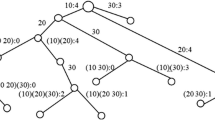Abstract
We consider the problem of mining sequential patterns over several large databases placed at different sites. Experiments carried out on synthetic data generated within a simulation environment are reported. We use several agents capable to communicate with a temporal ontology.
Access this chapter
Tax calculation will be finalised at checkout
Purchases are for personal use only
Preview
Unable to display preview. Download preview PDF.
Similar content being viewed by others
References
R. Agrawal and R. Srikant: Mining sequential patterns. In International Conference on Database Engineering, pages 3–14, Washington, D.C., 1995. IEEE Computer Society Press.
C. Bettini, X. Sean Wang, and S. Jajodia: Testing complex temporal relationships involving multiple granularities and its application to data mining. In Proceedings of the Fifteenth ACM Symposium on Principles of Database Systems, volume 15, pages 68–78, New York, NY 10036, USA, 1996. ACM Press.
D. W. Cheung, V. T. Ng, A. W. Fu, and Y. Fu: Efficient mining of association rules in distributed databases. IEEE Transactions on Knowledge and Data Engineering, pages 911–922, Dec 1996.
Luc Dehaspe and Hannu Toivonen: Discovery of frequent Datalog patterns. Data Mining and Knowledge Discovery, 3, 1999.
H. Mannila, H. Toivonen, and A. I. Verkamo: Discovering frequent episodes in sequences. In U. M. Fayyad and R. Uthurusamy, editors, Proceedings of the First International Conference on Knowledge Discovery and Data Mining (KDD-95), pages 210–215, Montreal, Canada, August 1995. AAAI Press.
F. Masseglia, F. Cathala, and P. Poncelet: The PSP approach for mining sequential patterns. In J. M. Zytkow and M. Quafafou, editors, Principles of Data Mining and Knowledge Discovery, LNAI 1510, pages 176–184, 1998.
Ryszard S. Michalski and Kenneth A. Kaufman: Data mining and knowledge discovery: A review of issues and a multistrategy approach. In R. S. Michalski, I. Bratko, and M. Kubat, editors, Machine Learning and Data Mining, pages 71–112. John Wiley, 1998.
T. M. Mitchell: Machine learning and data mining. Communications of the ACM, 42(11), Nov 1999.
R. Srikant and R. Agrawal: Mining sequential patterns: Generalizations and performance improvements. In Proceedings of the 5th International Conference on Extending Database Technology, Avignon, France, 1996.
S. Stolfo, A. Prodromidis, S. Tselepsis, W. Lee, D. Fan, and P. Chan: JAM: Java agents for meta-learning over distributed databases. In Proceedings of the 3rd International Conference on Knowledge Discovery and Data Mining, 1997.
Author information
Authors and Affiliations
Editor information
Editors and Affiliations
Rights and permissions
Copyright information
© 2000 Springer-Verlag Berlin Heidelberg
About this paper
Cite this paper
Letia, I.A., Craciun, F., Köpe, Z., Lelutiu, A. (2000). First Experiments for Mining Sequential Patterns on Distributed Sites with Multi-Agents. In: Leung, K.S., Chan, LW., Meng, H. (eds) Intelligent Data Engineering and Automated Learning — IDEAL 2000. Data Mining, Financial Engineering, and Intelligent Agents. IDEAL 2000. Lecture Notes in Computer Science, vol 1983. Springer, Berlin, Heidelberg. https://doi.org/10.1007/3-540-44491-2_28
Download citation
DOI: https://doi.org/10.1007/3-540-44491-2_28
Published:
Publisher Name: Springer, Berlin, Heidelberg
Print ISBN: 978-3-540-41450-6
Online ISBN: 978-3-540-44491-6
eBook Packages: Springer Book Archive




